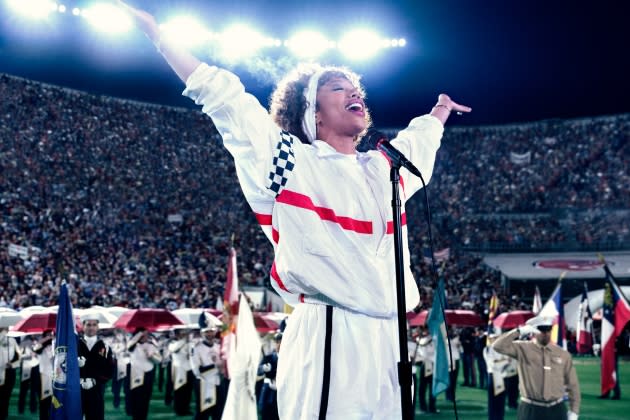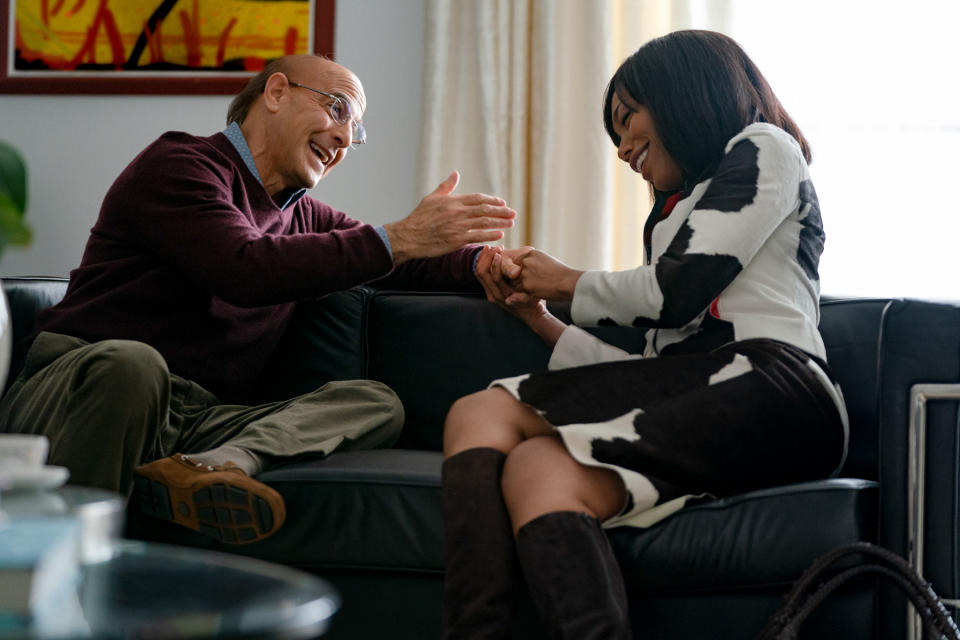‘I Wanna Dance with Somebody’ Comes to Praise Whitney Houston, Not to Bury Her
- Oops!Something went wrong.Please try again later.
- Oops!Something went wrong.Please try again later.

You don’t have to be fanatical about Whitney Houston to have a go-to Whitney moment — you just need to love the sound of a human voice soaring into the stratosphere. Early adopters would probably cite her 1983 appearance on The Merv Griffin Show, right after Clive Davis signed her to Arista (she sang “Home” from the play The Wiz). Others go straight to the “How Will I Know?” music video, which helped break her on MTV and thus, the pop charts. Hardcore Houston-heads know that if you want the real best-in-show performance, you check out the medley she performed at the 1994 American Music Awards of “I Loves You Porgy,” “And I Am Telling You,” and “I Have Nothing,” a true-blue vocalist triathlon. And don’t get us started on her definitive rendition of the National Anthem at the 1991 Super Bowl….
Whitney Houston: I Wanna Dance with Somebody recreates each of those moments with as much fidelity and remember-this authenticity as possible; even when it’s not cross-cutting between actual footage and actor Naomi Ackie channeling Houston during her heyday, this drama about Whitney’s ascent from Jersey church choirgirl to GOAT canon fodder plays like a meticulously simulated greatest-hits compilation. Officially sanctioned by the estate and given the full executive music-biopic treatment by director Kasi Lemmons (Eve’s Bayou), this look back at Whitney’s life and, reluctantly, her death has come to praise her, not to bury her. The movie knows you know all about the tabloid tragedies that have occasionally eclipsed Whitney’s legacy — that’s what the cottage industry of Houston documentaries are for. It would now like to re-emphasize the triumphs.
More from Rolling Stone
It's All High Notes and High Drama in the New Trailer for the Whitney Houston Biopic
Rihanna Crushes Hope for New Album, But Keeps Dream of New Music Alive
Her Scent Is Your Scent: HSN Unveils 'Signature' Whitney Houston Fragrance
Not that Dance skirts around the struggles that the “Greatest Love of All” singer suffered through in her 48 years on this earth: the turmoil on the home front, the pop-crossover blues and accusations of not being Black enough, the boos at the Soul Train Awards, the pressure that accompanied fame and endless touring, the rumors around her relationship with Robyn Crawford (Nafessa Williams), the strained relationship with her father (Clarke Peters) after he became her manager, almost everything about her relationship with Bobby Brown (Ashton Sanders). It just doesn’t have any interest in putting the superstar through her personal stations of the cross anymore. That’s been done.
Instead, the movie works determinedly, almost single-mindedly to bring the focus back to her talent. That was what made Arista Records founder Clive Davis (Stanley Tucci, part stunt casting and part inspired choice) sit up straight when he heard the young Houston sing at a tiny night club in New York City, and sign her almost immediately afterward. The talent was what inspired her mother, Cissy (Tamara Tunie), also a renowned and touring singer, to sacrifice the spotlight so her daughter could properly shine. (It’s Cissy who fakes a cough when Davis shows up at the Sweetwater’s gig, and Cissy who starts conducting the Merv Griffin Show’s orchestra when the tempo gets sluggish during Whitney’s appearance. Per the film, at least.) The talent is how Houston went from simply making records to breaking records.

And Ackie helps sell Houston as a singular talent even when it’s not her singing those legendary songs at Mt. Everest-level runs of mezzo-soprano notes. The British actor is the one tasked with giving us the ambitious artist, the woman with the golden ear for hearing future hits in rough demos, the creative collaborator who embraced the pop in R&B and who brought so many R&B stylings into ’80s pop music, in between the trilled and crooned lines. It isn’t just that Ackie is bewigged and bejeweled enough to resemble Whitney at her most awards-show glamorous, or her most casual-chic even when the dressing down for the medium is the message (that white sweatsuit at the Super Bowl wasn’t a coincidence). It’s that she doesn’t seem bewildered to take on a legend. There’s a constant feeling that a lot of hands were wrestling for the steering wheel of this biopic behind the scenes, with various parties pushing the story this way and that, even with the united goal of collectively crafting the greatest love letter of all. Yet Ackie just keeps her eyes on — and her energy directed toward — delivering a screen-worthy Whitney, scaling the heights and earning her Hall of Fame status.
She also lets you see the ego, the anger, the need for love and acceptance, the glimpses of erratic behavior, and the dependence on extracurricular substances that also characterized Whitney — not just near the end but throughout her career — even as the film keeps sidelining or pushing off the negative in order to accentuate the positive as long as possible. Yes, she sung like an angel, but Houston was also only human, the film sheepishly says. Then it steps back to let the actor show you the less-than-pretty aspects, as strongly depicted as they are briefly acknowledged. It works, even when I Wanna Dance with Somebody doesn’t.
Which is usually when the film bumps up against the curse that afflicts most music biopics: trying to depict a complicated life in a little over two hours. Screenwriter Anthony McCarten, who cowrote Bohemian Rhapsody, doesn’t try to push Houston’s romantic relationship with Crawford into the background or pretend it didn’t exist. There’s no gray area as to their love for each other, with Houston even telling Davis that the title song is about “when you wanna dance with somebody…but you just can’t.” Message received. But even Crawford, hired as a “creative assistant,” is eventually relegated to just another person there to say “No” or “Be careful” or “You’ve changed” or “You need to change” before exiting stage left.
Williams’ Crawford takes her place next to Peters’ fire-brimstone-and-hypocrisy patriarch, Tunie’s flinty but concerned mother, Sanders’ volatile yet unthreatening version of Brown (who gets the best non-Whitney line, justifying his cheating by saying, “It was the alcohol…and lots of it!”), and Tucci’s benevolent Papa Clive as supporting players in the sublimated Passion Play happening underneath the celebration. Clichés abound, from Eureka moments to ironic reprises of songs to foreshadowing galore — but hey, biopics gonna biopic. No one can say Houston doesn’t deserve a movie based on her story, though some might wish it rose above the usual template. It still gives you a slightly rushed retelling of a life with its lion’s share of ups and some subterranean downs, and succeeds in jogging our memory about the accomplishments over the aftermath. It ends on that 1994 American Music Awards showstopper, recreated in full. Even a facsimile of Houston’s high point is enough to drive home not what we lost, but what we gained by hearing that voice at all.
Best of Rolling Stone

